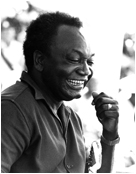
Ngũgĩ wa Thiong'o is a Kenyan writer and academic who writes primarily in Gikuyu and who formerly wrote in English. His work includes novels, plays, short stories, and essays, ranging from literary and social criticism to children's literature. He is the founder and editor of the Gikuyu-language journal Mũtĩiri. His short story The Upright Revolution: Or Why Humans Walk Upright, is translated into 100 languages from around the world.
The Noma Award for Publishing in Africa, which ran from 1980 to 2009, was an annual $10,000 prize for outstanding African writers and scholars who published in Africa. Within four years of its establishment, the prize "had become the major book award in Africa". It was one of the series of Noma Prizes.
Chirikure Chirikure alizaliwa (1962), Ni mtunzi wa mashairi, mwandishi wa nyimbo, aliehitimu chuo kikuu Zimbabwe na ni mjumbe wa chuo kikuu cha Iowa,( US). Amekuwa akifanya kazi Zimbabwe inayoongoza Kwa ushapishaji wa nyumba kama muhariri / mchapishaji Kwa muda wa miaka 17 mpaka 2002. Kwasasa anaendesha wakala wa fasihi na pia anafanya kazi, mshauri wa kitamaduni na mkalimani
Professor Chacha Nyaigotti-Chacha is a Kenyan playwright and consummate educationalist. He has served as an executive secretary of the Inter-University Council for East Africa (2000–2010), and was the first CEO of the Kenyan Higher Education Loans Board (1995–2000). He is currently serving as the Chairman of the Kenyan Commission for University Education (CUE).
Henry Odera Oruka was a Kenyan philosopher who is best known for "Sage Philosophy". It was a project started in the 1970s in an attempt to preserve the knowledge of the indigenous thinkers in traditional African communities.
Mnyazi wa Menza, also known as 'Mekatilili Wa Menza or Makatilili (1860s-1924) was a Kenyan independence activist who led the Giriama people against the colonial administration of Kenya between 1912 and 1915.
Bernard Mate was a Kenyan politician and one of the first group of Africans to be elected to the Kenya Legislative Council (LegCo), the then legislative arm of government in the British Colony of Kenya, representing what was the black constituency of Central Kenya. He served three terms in Kenya's Parliament until he lost his seat in 1979. He died on 6 January 1994, after a short illness. As a politician, he was part of the KADU's delegation to Kenya's Lancaster House Constitutional conferences. He was described by Oginga Odinga as a being a philosopher.
A genitive connector is a part of speech used in formation of compound terms through conjunctions. It is used especially in the Bantu languages to denote special word categories. Nouns can be modified by other nouns or other categories. There is prototypically a head word that comes before the connector and another one following. Long terms can therefore be achieved through the use of these genitive connectors. Commonly used connectors in Swahili take the form -a. Examples from selected bantu languages include.

Vernonia amygdalina, a member of the daisy family, is a small shrub that grows in tropical Africa. V. amygdalina typically grows to a height of 2–5 m (6.6–16.4 ft). The leaves are elliptical and up to 20 cm (7.9 in) long. Its bark is rough. V. amygdalina is commonly called Congo Bololo in D. R. Congo, bitter leaf in English because of its bitter taste. African common names include grawa (Amharic), ewuro (Yoruba), etidot (Efik), onugbu (Igbo), ityuna (Tiv), oriwo (Edo), Awɔnwono (Akan), chusar-doki or shuwaka (Hausa), mululuza (Luganda), labwori (Acholi), olusia (Luo), ndoleh (Cameroon) and olubirizi (Lusoga).
Mwanzele is a dance style originally performed during funerals by the Mijikenda tribe of the Coast Province of Kenya.

The Gabra ( ) are related to the wider Oromo people in the Horn of Africa, they mainly inhabit the Moyale and Marsabit regions of northern Kenya and the highlands of southern Ethiopia they mostly practice Islam and Christianity as religion but maintain mandatory cultural practice Ethiopia.
Henk Jaap Beentje is a Dutch botanist. In 1978 he obtained a masters in biology at the University of Amsterdam. He obtained his PhD at the Wageningen Agricultural University on the thesis A monograph on Strophanthus DC. (Apocynaceae), prepared under the direction of Hendrik de Wit and A.J.M. Leeuwenberg, in 1982.

Ronald Gideon Ngala (1923–1972) was a Kenyan politician who was the leader of the Kenya African Democratic Union political party from its creation in 1960 until its dissolution in 1964.

The history of Jainism in Africa is relatively short when compared with the histories of Judaism, Christianity and Islam on the same continent. There are about 20,000 Jains and around 10 Jain organizations in Africa.

The Wazi Campaign was a nationwide public awareness campaign that used 3-D animation to convey messages of peace and good governance in Kenya. This initiative was as a result of the bloody Post Elections Violence that rocked Kenya in 2007-08 Kenyan crisis.

Billy Kahora is a Kenyan writer and editor based in Nairobi. He was commended by the 2007 Caine Prize judges for his story Treadmill Love. His stories Urban Zoning and Gorilla’s Apprentice were shortlisted for the prize in 2012 and 2014, respectively. He has written the non-fiction novella The True Story of David Munyakei the screenplay for Soul Boy and co-wrote Nairobi Half Life. As Managing Editor of Kwani Trust, Kahora has edited seven issues of the Kwani? journal. He is a contributing editor to the Chimurenga Chronic.

Dr. Kimani Njogu is Kenyan linguist known for his role in study and advocacy of Kiswahili language.

Intersex people in Kenya face significant human rights violations, starting from birth. There are few protections from mutilation and non-consensual cosmetic medical interventions and no legislative protection from discrimination. Intersex persons may have difficulties in obtaining birth certificates and others forms of documentation.

Mass media in Tanzania includes print, radio, television, and the Internet. The "Tanzania Communications Regulatory Act" of 2003 created the Tanzania Communications Regulatory Authority, which oversees broadcast licensing. The Media Council of Tanzania began in 1995.









